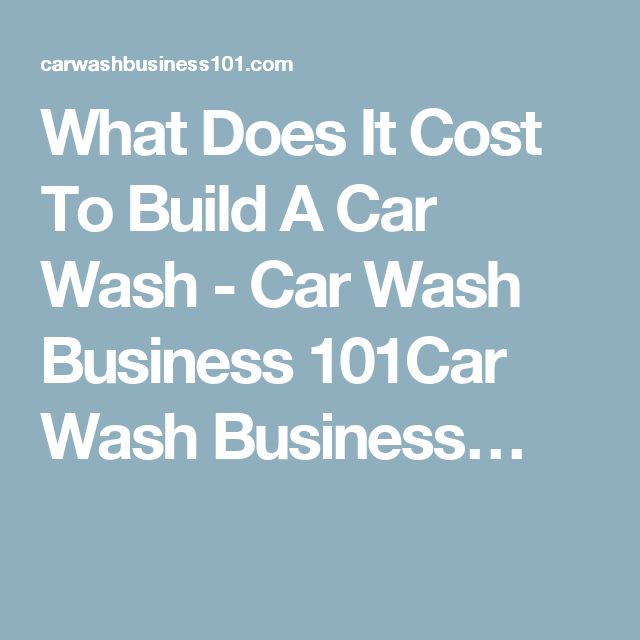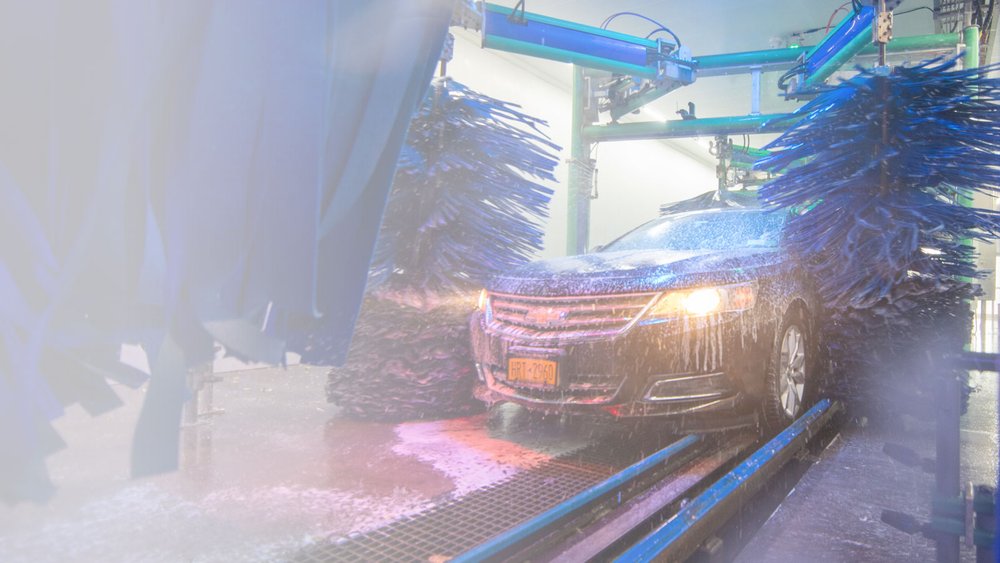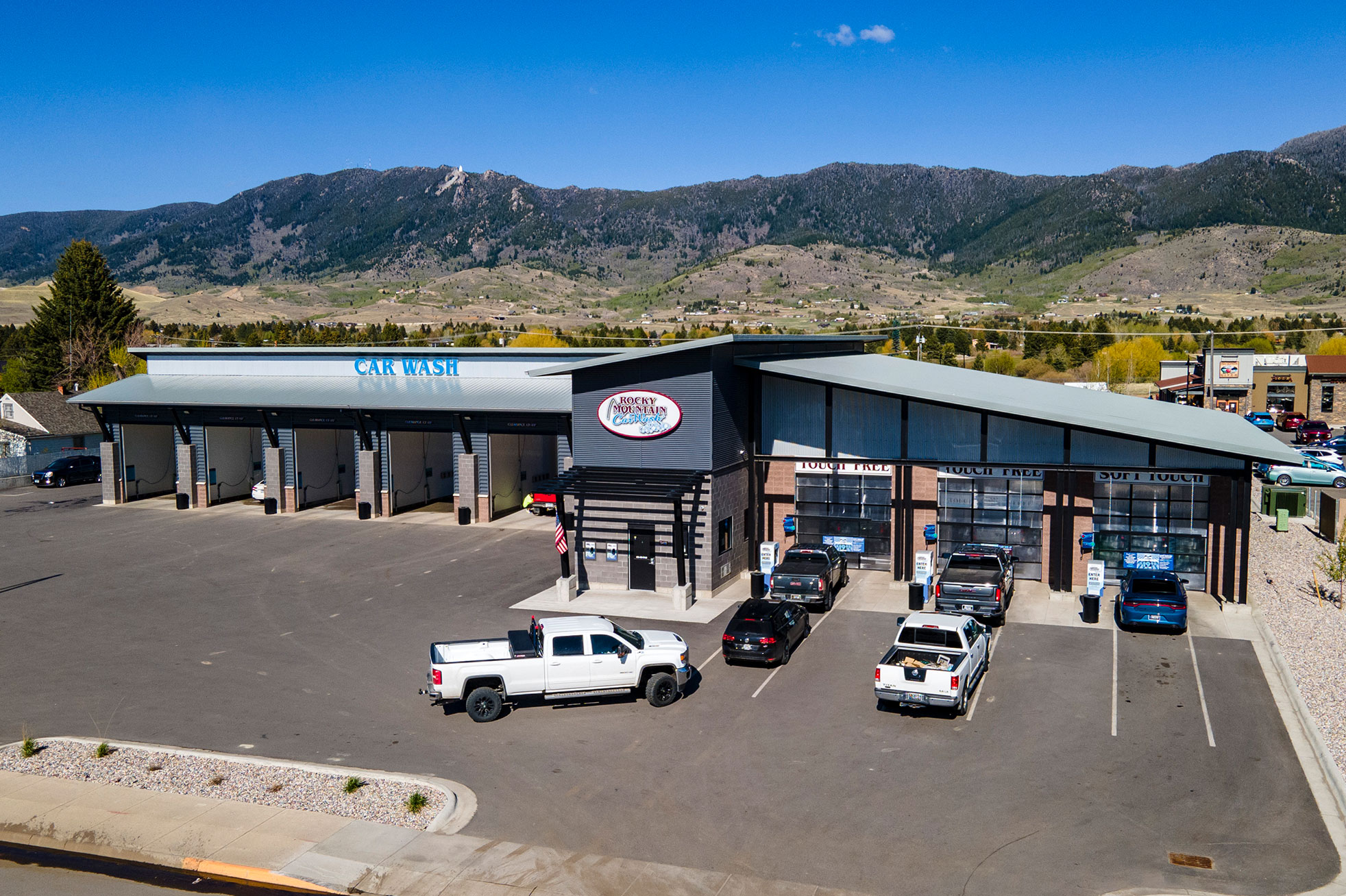
The allure of entrepreneurship is undeniable. The freedom to be your own boss, the potential for financial independence, and the satisfaction of building something from the ground up – these are powerful motivators. And for many, the car wash industry presents an intriguing opportunity. Cars need cleaning, and in today’s fast-paced world, convenience is king. A well-run car wash can be a consistent source of revenue, especially in areas with high traffic and a strong demand for car care services.
But before diving headfirst into this venture, it’s crucial to understand the financial realities. Building a car wash is a significant investment, and the costs can vary widely depending on numerous factors. From the land itself to the equipment and construction, every aspect contributes to the overall price tag. Failing to accurately estimate these costs can lead to budget overruns, delays, and ultimately, a struggling business.
Understanding the financial landscape is not just about avoiding pitfalls; it’s about maximizing your chances of success. Knowing the potential costs upfront allows you to create a realistic budget, secure adequate funding, and make informed decisions throughout the development process. This preparation will set you on the right path towards creating a thriving car wash business.
The dream of owning a successful car wash is attainable, but it requires careful planning and a thorough understanding of the financial implications. This involves delving into the various expenses involved in building a car wash, from land acquisition to construction, equipment, and ongoing operational costs. Having a clear understanding of these factors is paramount to success.
So, before you start envisioning the grand opening, let’s delve into the core question that every aspiring car wash owner needs to answer: What Does It Cost To Build A Car Wash? The answer isn’t simple, but we’ll break down all the key components to help you navigate this important decision.
Land Acquisition and Site Preparation
Location, Location, Location: The Importance of Land Costs
The location of your car wash is arguably the most crucial factor in its success. A high-traffic area with good visibility is essential for attracting customers. However, prime locations come at a premium. Land costs can vary significantly depending on the area, ranging from a few thousand dollars per acre in rural areas to hundreds of thousands or even millions in bustling urban centers.
Before settling on a location, conduct thorough market research to assess the demand for car wash services in the area. Consider factors such as the population density, the number of existing car washes, and the average income level of residents. A location with high traffic but a low demand for car washes might not be a wise investment.
Furthermore, the size and shape of the land will also influence the cost. You’ll need enough space for the car wash bays, drying areas, vacuum stations, parking, and potentially a waiting area or office. Irregularly shaped lots may require more extensive site preparation, increasing the overall cost.
Don’t underestimate the importance of accessibility. The site should be easily accessible from major roads and highways, with convenient entrances and exits. Consider the traffic flow and ensure that customers can easily enter and exit the car wash without causing congestion.
Finally, factor in potential zoning restrictions and environmental regulations. Some areas may have restrictions on the type of businesses allowed, or they may require extensive environmental impact studies before construction can begin. These factors can add significant costs and delays to the project.
Preparing the Ground: Site Work and Utilities
Once you’ve secured the land, the next step is to prepare it for construction. This involves clearing the land, grading the soil, and installing the necessary utilities. Site work can be a significant expense, particularly if the land is uneven or requires extensive excavation.
Grading is essential to ensure proper drainage and prevent water from pooling around the car wash. You’ll also need to install drainage systems to collect and dispose of wastewater. This is especially important for automatic car washes, which generate a large volume of wastewater.
Utilities are another crucial consideration. You’ll need to connect to the local water supply, sewer system, and electrical grid. The cost of connecting to these utilities can vary depending on the distance from the existing infrastructure and the complexity of the installation.
Consider the need for specialized utilities, such as natural gas for heating or compressed air for operating equipment. These may require additional connections and infrastructure, adding to the overall cost.
Finally, don’t forget about landscaping and paving. Landscaping can enhance the appearance of your car wash and make it more inviting to customers. Paving is essential for creating parking areas and driveways. The choice of paving material will depend on your budget and the desired aesthetic.
Construction Costs: Building the Car Wash Structure
Choosing Your Car Wash Type: Automatic vs. Self-Serve
The type of car wash you choose to build will significantly impact the construction costs. Automatic car washes, with their sophisticated equipment and complex infrastructure, are generally more expensive to build than self-serve car washes.
Automatic car washes require a longer, more enclosed building to house the equipment and accommodate the car wash tunnel. They also require more extensive plumbing and electrical systems to support the equipment.
Self-serve car washes, on the other hand, consist of individual bays where customers wash their own cars. These bays are typically open-air or partially enclosed and require less complex infrastructure.
The choice between automatic and self-serve depends on your target market and business goals. Automatic car washes offer convenience and speed, while self-serve car washes offer affordability and control.
Consider the demand for each type of car wash in your area. If there’s a strong demand for convenience, an automatic car wash may be a better investment. If affordability is a greater concern, a self-serve car wash may be more suitable.
Ultimately, the best choice depends on your specific circumstances and business objectives. Carefully weigh the pros and cons of each type of car wash before making a decision.
Materials and Labor: The Building Blocks of Your Car Wash
The cost of construction materials and labor will be a significant portion of your overall budget. Construction materials include concrete, steel, lumber, roofing, and siding. The prices of these materials can fluctuate depending on market conditions and supply chain disruptions.
Labor costs will depend on the prevailing wage rates in your area and the complexity of the construction project. You’ll need to hire a general contractor to oversee the construction process and coordinate the various trades.
Obtain multiple bids from reputable contractors before making a decision. Be sure to check their references and ensure that they are licensed and insured. A qualified contractor can help you stay on budget and ensure that the construction is completed to a high standard.
Consider the use of sustainable building materials and practices. Green building materials can reduce your environmental impact and potentially lower your operating costs in the long run.
Finally, factor in the cost of permits and inspections. Building permits are required for most construction projects and can add to the overall cost. Regular inspections are necessary to ensure that the construction complies with building codes and regulations.
Designing for Efficiency and Aesthetics
The design of your car wash can impact both its efficiency and its appeal to customers. A well-designed car wash will be easy to navigate, with clear signage and efficient traffic flow.
Consider the layout of the car wash to minimize congestion and maximize throughput. The placement of the wash bays, drying areas, and vacuum stations should be carefully planned to optimize the customer experience.
Aesthetically pleasing design can also attract customers. Consider the use of landscaping, lighting, and signage to create a welcoming and inviting atmosphere.
The choice of building materials and colors can also contribute to the overall aesthetic. Choose materials that are durable, easy to maintain, and visually appealing.
Work with an architect or designer who has experience in car wash design. They can help you create a car wash that is both functional and aesthetically pleasing.
Equipment Costs: The Heart of the Operation
Choosing the Right Equipment: New vs. Used
The equipment you choose will be the heart of your car wash operation. The cost of equipment can vary significantly depending on the type of car wash, the level of automation, and the quality of the equipment.
New equipment is generally more expensive than used equipment, but it also comes with a warranty and the latest technology. Used equipment may be more affordable, but it may require more maintenance and may not be as reliable.
Consider the long-term costs of owning and operating the equipment. Energy-efficient equipment can save you money on utility bills, while durable equipment can reduce the need for repairs and replacements.
Research different equipment manufacturers and compare their products. Read reviews and talk to other car wash owners to get their opinions.
Ultimately, the best choice depends on your budget and your long-term business goals. Carefully weigh the pros and cons of new vs. used equipment before making a decision.
Essential Equipment for Automatic Car Washes
Automatic car washes require a range of specialized equipment, including:
* Wash equipment: This includes the brushes, spray nozzles, and other components that clean the vehicles.
* Drying equipment: This includes the blowers and dryers that remove water from the vehicles.
* Conveyor system: This system moves the vehicles through the wash tunnel.
* Water recycling system: This system filters and reuses water to conserve resources.
* Point-of-sale system: This system allows customers to pay for their car washes.
The cost of this equipment can range from tens of thousands to hundreds of thousands of dollars, depending on the level of automation and the quality of the equipment.
Consider the need for optional equipment, such as pre-soak arches, tire cleaners, and undercarriage washers. These features can enhance the customer experience and attract more business.
Essential Equipment for Self-Serve Car Washes
Self-serve car washes require less equipment than automatic car washes, but they still require certain essential components, including:
* Wash bays: These are the individual bays where customers wash their own cars.
* Pressure washers: These machines provide high-pressure water for cleaning.
* Soap dispensers: These dispensers provide soap for washing.
* Wax applicators: These applicators apply wax to protect the paint.
* Vacuum stations: These stations allow customers to vacuum the interior of their cars.
The cost of this equipment is generally lower than the cost of equipment for automatic car washes, but it can still be a significant investment.
Consider the need for optional equipment, such as tire cleaners, spot-free rinse systems, and vending machines. These features can enhance the customer experience and generate additional revenue.
Permits, Licenses, and Legal Fees
Navigating the Regulatory Landscape: Permits and Licenses
Before you can start building your car wash, you’ll need to obtain the necessary permits and licenses. This process can be complex and time-consuming, so it’s important to start early.
The specific permits and licenses required will vary depending on your location and the type of car wash you’re building. Generally, you’ll need permits for construction, plumbing, electrical work, and environmental compliance.
You’ll also need to obtain business licenses from the local, state, and federal governments. These licenses allow you to operate a business legally.
The cost of permits and licenses can vary widely, but it’s important to factor these costs into your budget.
Consider hiring a consultant to help you navigate the regulatory landscape. A consultant can help you identify the necessary permits and licenses and guide you through the application process.
Legal Matters: Contracts and Agreements
Legal fees are another important consideration. You’ll need to hire an attorney to review contracts and agreements, such as the land purchase agreement, the construction contract, and the equipment lease agreement.
An attorney can also help you with legal issues that may arise during the construction process, such as disputes with contractors or neighbors.
The cost of legal fees will depend on the complexity of the legal work involved.
Don’t try to cut corners on legal fees. A qualified attorney can protect your interests and help you avoid costly mistakes.
Ongoing Operational Costs
Staffing and Labor Costs: Hiring the Right Team
Once your car wash is up and running, you’ll need to hire staff to operate it. Staffing costs can be a significant expense, so it’s important to budget accordingly.
The number of employees you’ll need will depend on the size and type of car wash. Automatic car washes typically require fewer employees than self-serve car washes.
Consider the need for managers, cashiers, attendants, and maintenance personnel.
The cost of labor will depend on the prevailing wage rates in your area and the skills and experience of your employees.
Provide training to your employees to ensure that they are knowledgeable and efficient.
Offer competitive wages and benefits to attract and retain qualified employees.
Utilities and Maintenance: Keeping the Car Wash Running Smoothly
Utilities are another significant ongoing expense. You’ll need to pay for water, electricity, natural gas, and sewer services.
The cost of utilities will depend on the size and type of car wash, the volume of business, and the local utility rates.
Implement water and energy conservation measures to reduce your utility bills.
Regular maintenance is essential to keep your car wash running smoothly. You’ll need to maintain the equipment, the building, and the grounds.
The cost of maintenance will depend on the age and condition of the equipment and the frequency of maintenance.
Schedule regular maintenance checks to identify and address potential problems before they become major issues.
Insurance and Marketing: Protecting Your Investment
Insurance is essential to protect your investment in your car wash. You’ll need to obtain liability insurance, property insurance, and workers’ compensation insurance.
The cost of insurance will depend on the size and type of car wash, the location, and the coverage limits.
Shop around for insurance to find the best rates.
Marketing is essential to attract customers to your car wash. You’ll need to develop a marketing plan to promote your business.
Consider advertising in local newspapers, radio stations, and online directories.
Offer discounts and promotions to attract new customers and retain existing customers.
Utilize social media to connect with customers and promote your business.
So, What Does It Cost To Build A Car Wash? These ongoing operational costs contribute significantly to the overall cost. Considering these will help you estimate how much you will need to spend to keep the business afloat.
Financing Options: Funding Your Car Wash Dream
Exploring Loan Options: Banks and Credit Unions
Building a car wash is a significant investment, and most entrepreneurs will need to secure financing to make their dream a reality. Several financing options are available, each with its own advantages and disadvantages.
Banks and credit unions are a common source of funding for car wash projects. They offer a variety of loan products, including small business loans, commercial real estate loans, and equipment loans.
The interest rates and terms of these loans will vary depending on the lender, your credit history, and the collateral you can offer.
Prepare a comprehensive business plan to present to potential lenders. The business plan should include a detailed description of your business, your market analysis, your financial projections, and your management team.
Shop around for the best loan rates and terms. Compare offers from multiple lenders before making a decision.
Alternative Funding Sources: SBA Loans and Investors
The Small Business Administration (SBA) offers loan programs that can help small businesses obtain financing. SBA loans are guaranteed by the government, which makes them less risky for lenders.
The SBA offers a variety of loan programs, including the 7(a) loan program and the 504 loan program.
SBA loans typically have lower interest rates and longer repayment terms than conventional loans.
Consider seeking funding from investors. Investors can provide capital in exchange for equity in your business.
Angel investors and venture capitalists are common sources of funding for start-up businesses.
Prepare a compelling pitch to present to potential investors. The pitch should highlight the potential of your business and your management team.
Conclusion
Understanding the costs associated with building a car wash is crucial for any aspiring entrepreneur in this industry. From the initial land acquisition and site preparation to the ongoing operational expenses, every aspect plays a role in the overall financial picture. By carefully considering each of these factors, you can develop a realistic budget and make informed decisions that will set you on the path to success. What Does It Cost To Build A Car Wash? It is important to consider the different kinds of costs associated with the process.
Building a car wash is a significant undertaking, but with careful planning and execution, it can be a rewarding and profitable venture. By doing your research, seeking expert advice, and staying focused on your goals, you can turn your car wash dream into a reality.
We hope this article has provided you with valuable insights into the costs involved in building a car wash. Feel free to check out our other articles for more information on starting and running a successful business.

